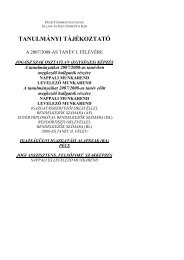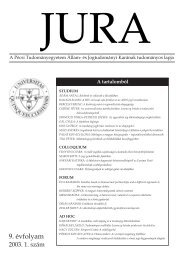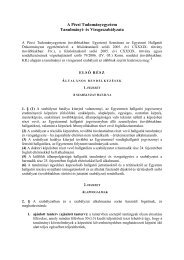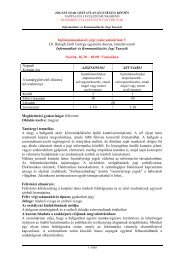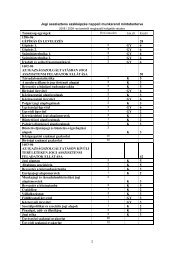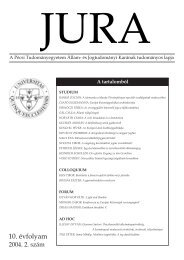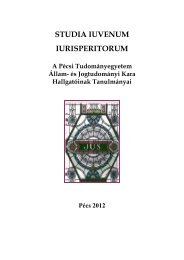2012. évi 2. szám - Jura - Pécsi Tudományegyetem
2012. évi 2. szám - Jura - Pécsi Tudományegyetem
2012. évi 2. szám - Jura - Pécsi Tudományegyetem
- TAGS
- jura
Create successful ePaper yourself
Turn your PDF publications into a flip-book with our unique Google optimized e-Paper software.
112 Máté Julesz: Civil Society and Environmental ProtectionMáté Juleszresearch fellow (Szeged)Civil Society andEnvironmental Protection1. Rule of Law and Civic ControlThe Preamble of the Universal Declaration of HumanRights (UNO, 1948) states that it is essential, if man isnot to be compelled to have recourse, as a last resort, torebellion against tyranny and oppression, that humanrights should be protected by the rule of law. Article 20of the Declaration specifies that everyone has the rightto freedom of peaceful assembly and association.From the aspect of maintenance of the rule of law,state should be under civic control. Civic control impliesthe social activity of both groups of people andalso individuals. In Eastern European countries, civiccontrol is controlled by the state, the state recognizingand subsidizing only those civic organizations whichare registered and controlled by state organs. In Centraland Western European countries, the situationis somewhat similar, though in practice individualsmay have their voices heard.In many Eastern European countries, the rightto freedom of peaceful association is mostly wellfunctioning.Nevertheless, individuals do not havethe rights to exert civic control over the state withefficacy comparable to that of associations. The everpresentproblem is whether an individual who has nodirect interest in a particular case should or shouldnot be allowed to defend other people’s interests.In most European countries, only associations havesuch rights. There are exceptions of course. Accordingto Paragraph (3) of Article 52 of the Constitution ofPortugal, for example, everyone, either personally orthrough associations that purport to defend the interestsat stake, enjoys the right to actio popularis in thecases and under the conditions provided by law, i.e.the right to promote the prevention, the suppressionand the prosecution of offences against public health,the environment, the quality of life and the culturalheritage, and also the right to claim correspondingdamages for the aggrieved party.<strong>2.</strong> Division of Political Power, actiopopularisCivic control might possibly be doomed to vanish inEastern European countries, which are appreciablypoorer than their Western European counterpartsand hence less sensitive in rule of law matters. Suchphenomena as NIMBY (Not In My Back Yard), etc.do not play important roles in the field of civic controlin this region. NIMBY is rooted in the fabric ofthe political life in Western European countries. InPoland, the Czech Republic, the Slovak Republic andHungary, NIMBY is considered solely by theoreticians.In these Visegrad countries (V-4), civic controlis slowly but saliently losing its weight in politics. Thedivision of political power appeared in the philosophyof Aristotle, Cicero, John Locke, Montesquieu,etc. The Montesquieu mode of division of politicalpower ([1] legislative, [2] executive and [3] judiciarypowers) is currently becoming weaker, and thesethree political powers are united by the winner ofparliamentary elections.A legislature independent of executive powerwas a dream that never materialized in the V-4countries. Around the end of the 1980s, attemptswere made to bring about a Montesquieu divisionof political power, though the last two decades havedemonstrated that legislature and executive powercan function only in the hands of the governing majority.The electoral winners appointed new publicadministrators in order to ease the execution of theacts of parliament.During the communist era, judiciary power waslikewise in the hands of politics, under full governmentalcontrol. Around 1990, however, the situationchanged. In those Eastern European countrieswhere the parliamentary elections led to a largemajority, the judiciary system was re-organizedso as to serve the interests of the new government.One example is the case of Hungary. Under suchcircumstances, the division of political power hasundergone a change of face. Since the legislative,executive and judiciary powers are in the samehands, the role of civic control over the state is to bestressed. Associations and civic individuals shouldcounterbalance the leading political power. Civiccontrol and a state controlled in a civic manner arethe new political powers.Associations have special rights within the state.Civic activities are destined to be expanded and newmeans of civic control to be developed. Actio popularisis only one means, though, for example in Hungary,the right to actio popularis before the ConstitutionalCourt (whereby anyone without a special interestcould request the Constitutional Court to examinelegal norms) is to be terminated from January 1,<strong>201<strong>2.</strong></strong> In environmental law and the law on consumerprotection, the right to actio popularis still survives.Registered associations, as legal entities, may defendother people’s interests.JURA 2012/<strong>2.</strong>



